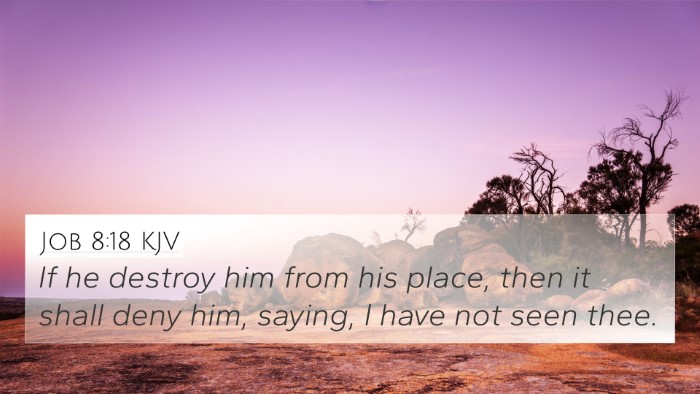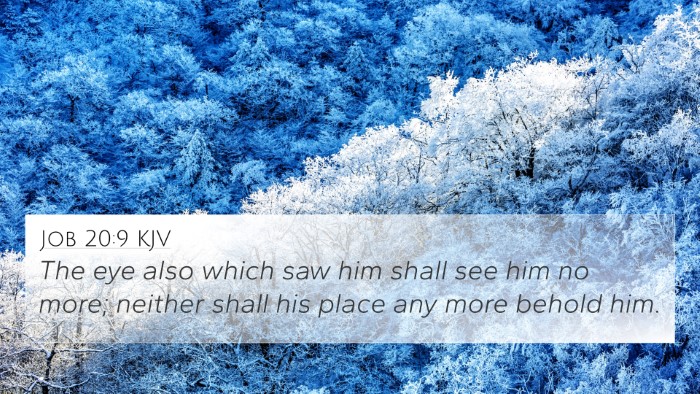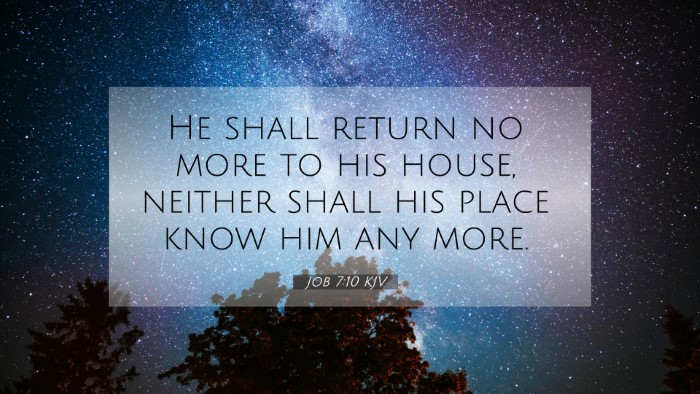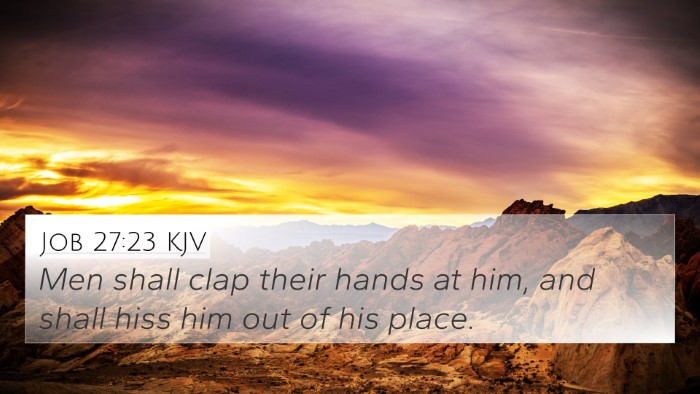Old Testament
Genesis Exodus Leviticus Numbers Deuteronomy Joshua Judges Ruth 1 Samuel 2 Samuel 1 Kings 2 Kings 1 Chronicles 2 Chronicles Ezra Nehemiah Esther Job Psalms Proverbs Ecclesiastes Song of Solomon Isaiah Jeremiah Lamentations Ezekiel Daniel Hosea Joel Amos Obadiah Jonah Micah Nahum Habakkuk Zephaniah Haggai Zechariah MalachiJob 7:10 Similar Verses
Job 7:10 Cross References
He shall return no more to his house, neither shall his place know him any more.
Uncover the Rich Themes and Topics of This Bible Verse
Listed below are the Bible themes associated with Job 7:10. We invite you to explore each theme to gain deeper insights into the Scriptures.
Job 7:10 Cross Reference Verses
This section features a detailed cross-reference designed to enrich your understanding of the Scriptures. Below, you will find carefully selected verses that echo the themes and teachings related to Job 7:10 KJV. Click on any image to explore detailed analyses of related Bible verses and uncover deeper theological insights.

Job 8:18 (KJV) »
If he destroy him from his place, then it shall deny him, saying, I have not seen thee.

Job 20:9 (KJV) »
The eye also which saw him shall see him no more; neither shall his place any more behold him.

Psalms 103:16 (KJV) »
For the wind passeth over it, and it is gone; and the place thereof shall know it no more.

Job 27:21 (KJV) »
The east wind carrieth him away, and he departeth: and as a storm hurleth him out of his place.
Job 7:10 Verse Analysis and Similar Verses
Understanding Job 7:10
Job 7:10 (KJV): "He shall return no more to his house, neither shall his place know him any more."
Summary of Meaning
In Job 7:10, Job articulates a deep sense of despair regarding mortality and the finality of death. This verse encapsulates the overwhelming sense of loss that accompanies the passing of a loved one, as well as the inevitable reality that once life has ended, it cannot be reversed. Theological commentaries highlight Job's recognition that earthly life is fleeting, and that one’s presence is ultimately transient.
Commentary Insights
-
Matthew Henry:
Henry emphasizes that Job is expressing the finality of death. Once a person has died, they leave behind both their home and their connections. Henry alerts us to the importance of living with a perspective that values the ephemeral nature of life, urging readers to find hope beyond the grave.
-
Albert Barnes:
Barnes notes the deep sorrow expressed in this verse. He emphasizes that death is a great separator, severing relationships and disrupting the familiar order of life. He also associates the lament with a broader understanding of the human condition, where all mortals experience loss.
-
Adam Clarke:
Clarke provides a perspective that Job's words reflect not just personal grief but also a universal truth about death. He notes how this lament mirrors the feelings of many who face bereavement, serving as a reminder to cherish life and the relationships we have while we still can.
Cross-References for Job 7:10
To deepen your understanding of Job 7:10, consider these related Bible verses:
- Ecclesiastes 9:5: "For the living know that they shall die: but the dead know not any thing, neither have they any more a reward; for the memory of them is forgotten."
- Psalms 39:13: "O spare me, that I may recover strength, before I go hence, and be no more."
- Psalms 90:10: "The days of our years are threescore years and ten; and if by reason of strength they be fourscore years, yet is their strength labour and sorrow; for it is soon cut off, and we fly away."
- Hebrews 9:27: "And as it is appointed unto men once to die, but after this the judgment."
- Job 14:7-9: "For there is hope of a tree, if it be cut down, that it will sprout again, and that the tender branch thereof will not cease... if it die, it will live again."
- Isaiah 38:18: "For the grave cannot praise thee, death cannot celebrate thee: they that go down into the pit cannot hope for thy truth."
- 1 Corinthians 15:22: "For as in Adam all die, even so in Christ shall all be made alive."
Connections Between Bible Verses
Job 7:10 serves as a poignant reminder of the transient nature of human experience. This theme of mortality is echoed throughout Scripture:
- Job's lament connects with the wisdom literature's reflections on life and death.
- The teachings in Ecclesiastes resonate with Job's recognition that death is a sure reality and should encourage us to live wisely.
- Psalms often reflect on the brevity of life and echo the same sentiments of loss and the need for redemption.
- The New Testament reminds believers of hope beyond death through the resurrection, as noted in 1 Corinthians 15:22.
Thematic Bible Verse Connections
Several themes arise when considering Job 7:10, emphasizing the human struggle with mortality, loss, and the search for understanding in suffering:
- Mortality: The broader theme of life’s fragility is explored through cross-references that touch upon the finality of death.
- Hope and Redemption: While Job expresses despair, other verses promise hope and a future, shifting focus from despair to faith.
- Suffering: The connection of suffering in Job’s narrative with the ultimate hope in God’s providence reflects a key biblical theme.
Tools for Bible Cross-Referencing
Using tools for Bible cross-referencing can enhance your study of the Scriptures:
- Bible Concordance: These are invaluable for finding keywords and their occurrences across the Bible.
- Cross-reference Bible Study: Encourages deeper exploration of related themes and texts.
- Bible Reference Resources: Utilize study Bibles that offer commentary and cross-referencing features.
Conclusion
Job 7:10 serves as a powerful reminder of the reality of death and the emotional weight it carries. Through comparative analysis and scriptural cross-referencing, this verse can guide readers in understanding larger biblical themes concerning mortality and hope. By studying related verses, one can appreciate the interconnectedness of biblical texts and how they together illuminate the human experience.



